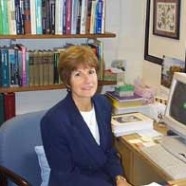The Union community is mourning the death of Barbara Boyer, emerita faculty member in biology who taught at Union for more than 35 years. She died April 27 at the age of 83.
A specialist in invertebrate development and noteworthy researcher – in 1984, she was honored by having a tropical flatworm named after her, Convoluta boyeri –Boyer earned a bachelor’s degree with distinction from the University of Rochester in 1963, an M.S. from the University of Michigan in 1964 and a doctorate from Michigan in 1969.
She came to Union in 1973, the same year that her husband, John, joined the department. The couple, who were married in 1968, retired together at the end of the 2010 academic year as full professors. John Boyer died in January 2016 at 74.
Barbara Boyer taught developmental, marine and coastal biology; invertebrate zoology; and a course in “Images of the Sea.” The coastal biology and sea courses were part of an interdisciplinary Marine Studies Program that brought together marine biology, marine sociology and environmental studies.
Along with Ilene Kaplan, the Joseph C. Driscoll Professor of Sociology and Marine Policy, Boyer was instrumental in developing the Marine Studies Term Abroad, the first team-taught interdisciplinary term abroad at Union.
“Barbara Boyer was always a dedicated teacher and scholar who knew how to bring out the best in her students, from fieldwork in the rocky intertidal to working with microscopes in the lab,” said Kaplan. “She integrated an appreciation for the environment and marine life in her classes.
“Her expertise ranged from tropical to subarctic marine environments, and she could always be counted on to come up with creative and challenging projects and activities for students in Bermuda, New England and Newfoundland.”
Kaplan noted that Boyer served as an enthusiastic role model to her student research assistants, bringing them to the renowned Marine Biological Laboratory (MBL) in Woods Hole, Mass., during the many years she conducted research there.
From 1989-1991 Boyer was science co-chair of the Children’s School of Science at MBL. She also was an elected member of The Corporation of the Marine Biological Corporation in Woods Hole.
“Woods Hole held a particular place in her heart, not only because of the rich research environment there, but as the place where she and her husband met as graduate students,” recalled Barbara Danowski, professor emeritus of biology.
Boyer’s research is especially significant, Danowski said.
“Barbara studied flatworms, the closest surviving relatives of the first animals to evolve body plans such as ours, with bilateral symmetry instead of radial symmetry. Her research helped to change the thinking of the field with respect to the evolution of body plan. Her 2000 paper in Developmental Biology continues to be cited by scientists around the world, and collectively, her research papers have been cited in over 600 publications.”
While at Union, Boyer did sabbatical research at Stanford University and at the University of Barcelona. In Barcelona, she was the first person to help in a lab with a project on the location of Hox genes in the embryos of polyclad flatworms.
Kaplan noted that the tropical worm named after Boyer was discovered on a research expedition on marine invertebrates in the Philippines.
Boyer was the recipient of many grants from the National Science Foundation. In addition to her research and teaching, she was involved in a range of College projects and programs, including the Student Affairs Council (chair), Middle States Steering Committee, Minerva Committee, Union College Child Care Center (co-chair) and President’s Commission on the Status of Women.
“Barbara was a true teacher-scholar,” Danowski said. “As a colleague, she was supportive, generous with her time and a wonderful mentor. As an educator, she conveyed her love of biology so effectively that students flocked to her courses.”
“I did my senior project with Barb and kept in touch with her over the years,” environmental toxicologist and science writer Emily Monosson ’83 said in a Union College profile. “She was a role model as a young mom and biology professor with an active research program. She was always very accessible.”
In an interview for a news story celebrating women at Union, genetic counselor Ellen T. Matloff ’91, CEO of the digital tech startup MyGeneCounsel, also cited Boyer as one of several inspiring female faculty.
“She showed me that science is not just a guy’s game,” Matloff said.
Barbara Boyer maintained addresses in Schenectady and Philadelphia. Survivors include her children, Cynthia and Paul, and several grandchildren.
For more information, go to Wetzel and Son Funeral Home.
